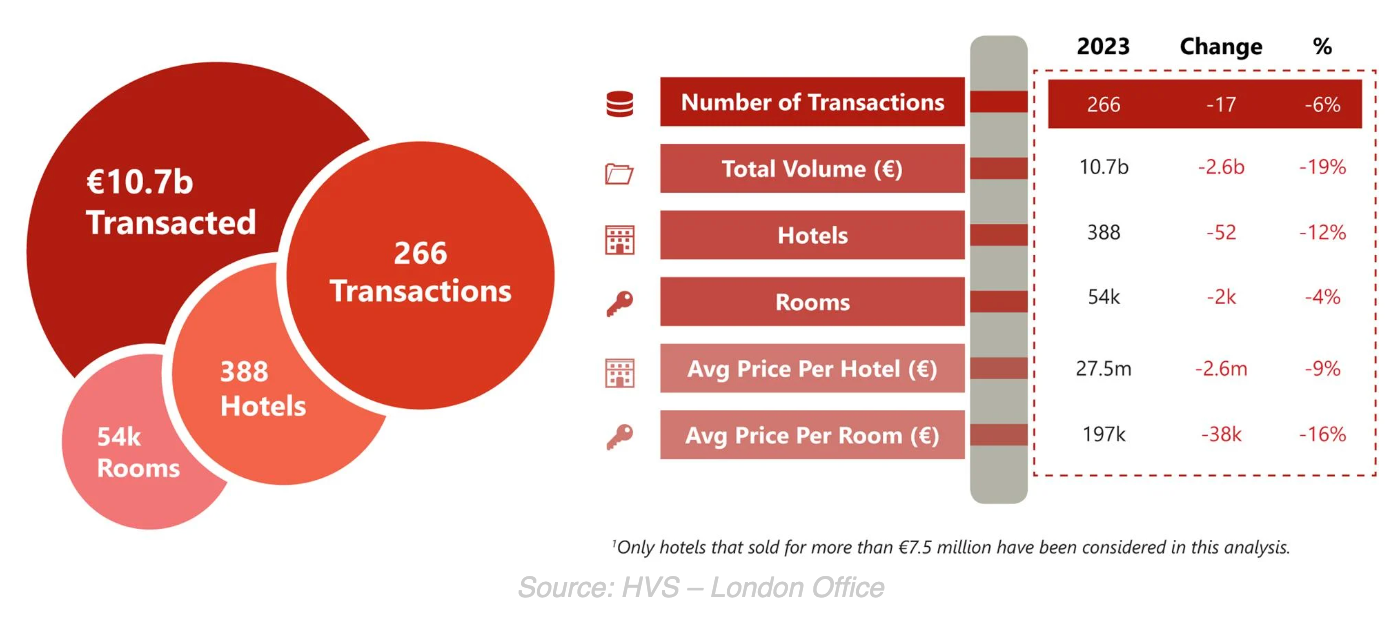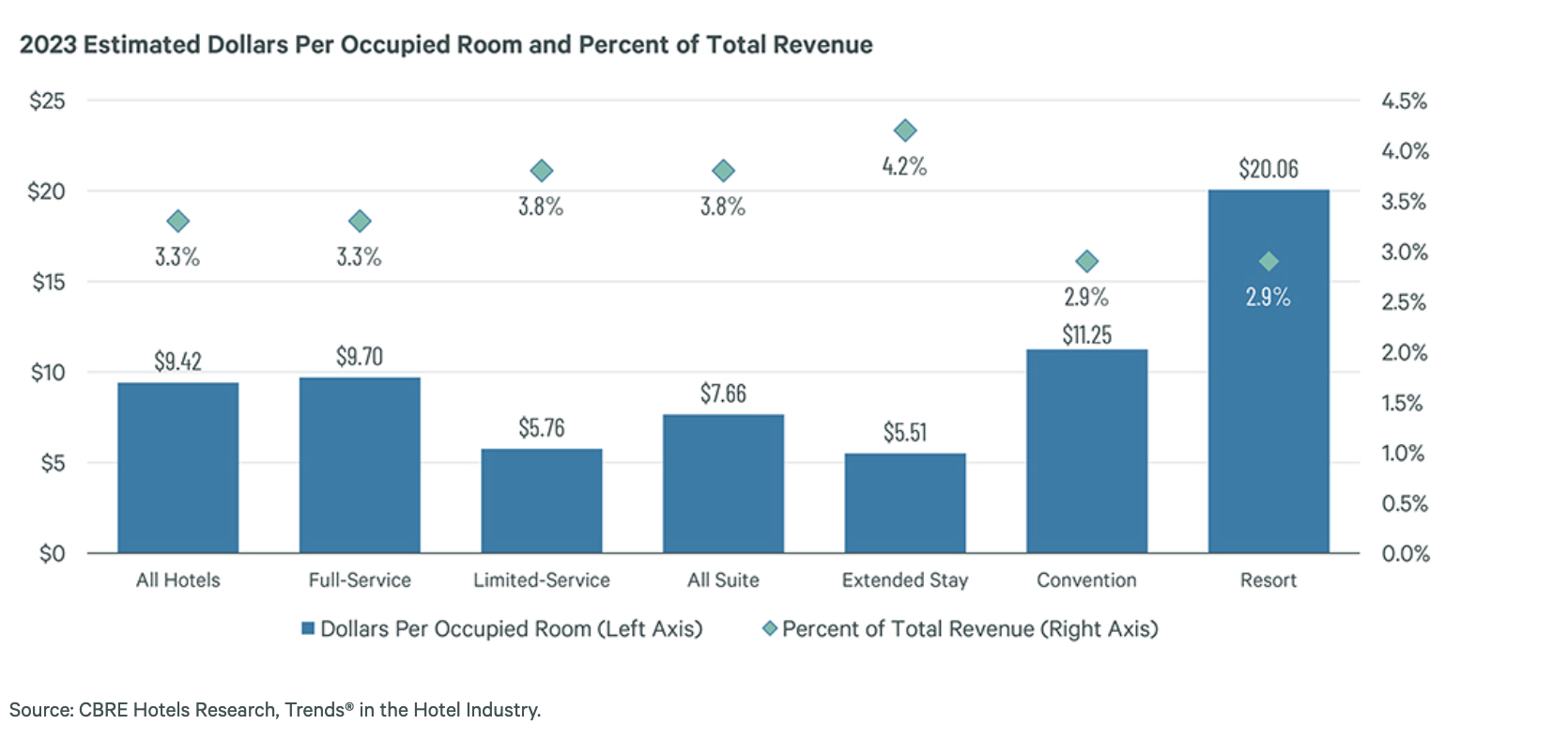
Weekly Insights. April 6, 2024
Best hospitality industry articles focused on 💵revenue, 📊markets, and 🎯strategy (Mar 31 - Apr 6, 2024).
2023 European hotel transactions
HVS discusses the main hotel transactions that took place in 2023 and looks at the trends in single-asset and portfolio transactions over the years.

Gaining control of utility costs
Over the past four years, utility costs at U.S. hotels have increased at a pace greater than total operating revenue. As a result, utility department expenses increased from 2.9 percent of total revenue in 2019 to an estimated 3.3 percent in 2023. As hotels have struggled to recover from the pandemic, any rise in cost ratios is an area of concern for owners and operators.
The good news is that pace of growth appears to be slowing down. Year-over-year growth rates for utility expenditures have declined on a dollar per-available-room (PAR) basis from a high of 21.4% in 2022 to an estimated 4.0% in 2023. Taking the variability of increasing occupancy levels into account, the growth in utility expenses measured on a dollar per-occupied room (POR) basis was under one percent each of the past two years.

B2B hotel marketing strategies for building brand loyalty
In the competitive landscape of the B2B hotel industry, establishing and nurturing brand loyalty has never been more critical. As businesses increasingly seek partnerships that offer more than just a transactional relationship, hotels must innovate their marketing strategies to meet these evolving expectations. This blog delves into the multifaceted approach to B2B hotel marketing, outlining strategies designed to foster deep, lasting connections with business clients. By embracing the digital transformation, personalizing customer interactions, and reimagining loyalty programs, hotels can unlock new levels of brand loyalty, ensuring they remain the preferred choice for business clients in a rapidly changing market.

Debunking pricing myths in hospitality: A shift in perspective
In the hotel industry, the traditional race to offer the best rates has often overshadowed the importance of guest experience and value. This blog post challenges the conventional focus on pricing, unveiling the deeper elements that define success. We'll debunk myths that have long influenced hotel management strategies, highlighting the significance of understanding guest motivations and the transformative impact of unique value propositions. This exploration offers actionable insights for hoteliers looking to differentiate their property by prioritizing memorable experiences and personalized service instead of racing with the competition to a rock-bottom rate.

How generative AI is impacting revenue management for hotels
Generative artificial intelligence has been a constant headline-maker in the travel tech world through the past year. So, it’s no surprise many industry experts believe the technology has the power to change processes on the whole, including in how hotels strategize - and maximize - their opportunities to drive revenue.
While the full potential of generative AI remains to be seen, many industry experts expect change of some kind whether it involves increased efficiency, a bridge between revenue management and other hospitality operations or new capabilities for revenue managers.

The future of hotel distribution channels: Seizing opportunity in channel disruption
The hotel distribution channel landscape is undergoing a seismic shift. Online travel agencies (OTAs) that once leveled the playing field for independent properties now dominate, their economic muscle squeezing hotel margins. Metasearch engines commoditize the search experience, making standalone properties indistinguishable. Meanwhile, the growth in alternative lodging threatens hotels' grip on the accommodations sector.
Yet within this disruption lies opportunity for savvy hoteliers. Emergent technologies now enable hotels to tailor the guest experience as never before. Strategic partnerships build localized affinity. Targeted social media expands reach. As we'll explore here, taking an imaginative, omni-channel approach to distribution can transform a threat into an opportunity to acquire customers at a fair cost.

Hotel brands: Complete guide to the top hotel chains
Hotel brands are unique identities created by hotel chains or individual hotels to stand out in the market. They represent a mix of services, designs, and experiences tailored to different types of guests, such as luxury seekers or budget travellers. These brands help hotels attract loyal customers, showcase what makes them special, grow their revenue, and compete effectively in the busy hospitality sector.
However, not all hotel brands carry the same level of recognition, value, or distinctiveness. Some brands have become household names, renowned for their exceptional service, iconic design, and consistent quality across locations. These leading brands often command higher prices and a loyal following. In contrast, lesser-known or emerging brands may struggle to make their mark, competing on price or niche offerings to attract guests.
The value and distinctiveness of a hotel brand can significantly influence its market position and the perceptions of potential guests, making brand development and management a critical aspect of hotel operations.

Marriott, Hilton and Hyatt may not operate that hotel. Here's why. | WSJ The Economics Of
Follow on LinkedIn




